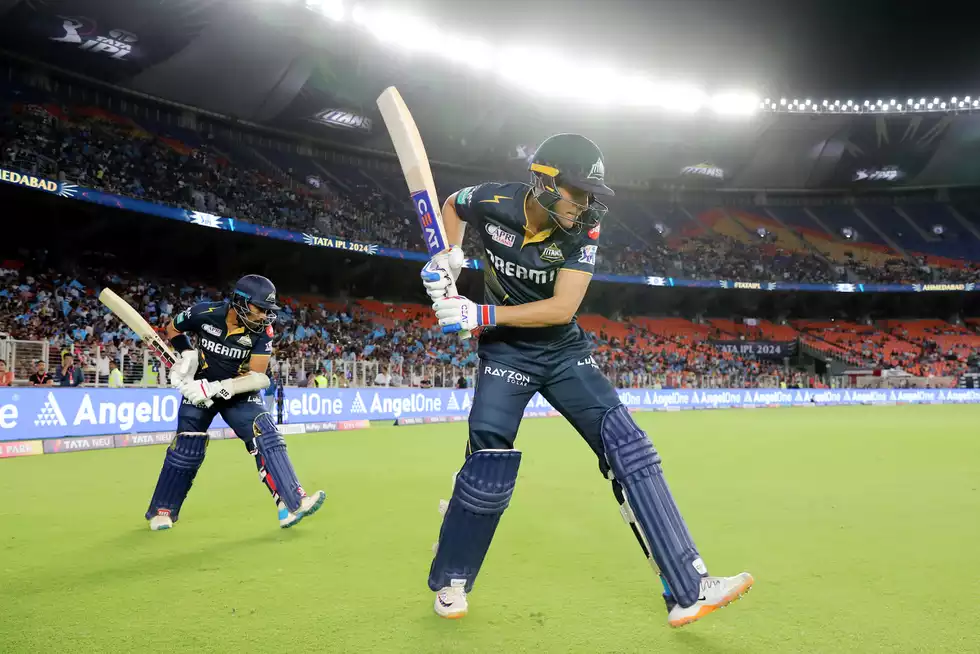In terms of opening day, the Gujarat Titans could not have asked for a more successful IPL campaign. First year champions, second year runners-up. However, they have experienced a slight gravitational pull from IPL 2024. They are still in the running for qualification, but they will need to make significant progress and have a significant change in luck to make it to the postseason again.
Vikram Solanki, GT’s Director of Cricket, talks about the season thus far, the mitigating circumstances in the lead-up, Shubman Gill’s captaincy, and more in a conversation with Cricbuzz.
Take-outs:
At this stage in the previous two years, just before the halfway mark, you would have needed a win or two to guarantee your qualification. Comparatively speaking, this season has been very difficult, hasn’t it?
Yes, I believe that to be a fair evaluation. You must admit that the past two years have been exceptional. Yes, we have faced difficulties, but if you look at the standings, you will see that we share a number of positions with many other clubs. The competition will enter an extremely fascinating phase in the second half of the season. The table appears completely different very fast if we can secure a few victories. We eagerly anticipate the second part. We fully admit that we’ve faced difficulties and that we haven’t always performed to our best ability, and I believe it speaks to the situation we find ourselves in.
Is it accurate to suggest that a portion of this unpredictable season can be attributed to the kind of adjustment in direction you had to make following that significant preseason trade?
No, I don’t think that’s at all the case. It’s probably a combination of factors. As you described it, I don’t think you can view it as a course adjustment. We were generally satisfied with the players we had when the auction ended. I believe that Mohammed Shami’s passing has been a great loss for us. That’s really clear. We’ve seen injury problems ever since, and that varies from season to season. Some teams manage to go entire seasons without suffering any kind of major injuries. Some teams suffer injuries, yet because of their roster composition, they are able to cope. We simply need to navigate our way around the obstacles in our path, which include the injured players and, to be completely honest, some of our past performances. The truth that we haven’t always performed at our best cannot be avoided.
Prior to the auction, you were aware of Hardik Pandya’s departure, but did you also know how seriously injured Shami was? Were you aware that this season will be without him?
No, we didn’t. Mohammed Shami’s passing is deeply felt by us. The timing of the announcement or the realization that Mohammed Shami would not be joining us was not ideal. But in the case of injuries, that is. An injury to one of your main players seldom happens at a good time. Coincidentally, we found out about Shami’s withdrawal from this year’s IPL rather soon to the start of the season. We did not know how much. Although we were aware of the injury, we did not anticipate the course of events that led to it.
Given that you had other matters to attend to, was covering Shami a part of your auction strategy?
We kind of expected him to play this season, to be honest. You can see that your bidding strategy will be very different if you anticipate him playing this season. We thought he would be prepared for the season. If we had known, would we have taken a different action? Although we may have done things differently, we never reached that stage. Looking back is a beautiful thing. As all the teams do, we attempted to provide coverage for our injuries during the auction; yet, how can one provide coverage for an individual such as Mohammed Shami? You’ve seen what he’s done for India; he had a fantastic season with us. You just can’t fill in for someone like that. Even while you can prepare ahead and find alternatives, it is still going to be difficult to replace someone like him who has contributed so much to our squad over the past two years. However, that’s to be expected; that’s what teams deal with. He’s not the only bowler or important player to suffer an injury. It has happened to other franchises in the past. In this case, we have to handle it.
The IPL introduced mid-season loan transfers of players (capped as well) who had appeared in fewer than two games for their original club four years ago. Many teams are struggling with injuries, as you have pointed out, so why haven’t clubs made more use of this system? As some would say in football, a loan arrangement… Many teams have benched players who could have played elsewhere and haven’t played. It seems like a win-win situation, but why hasn’t that rule been implemented?
To be honest with you, the BCCI should answer that issue on why that hasn’t happened. In my opinion, the majority of the time, when you see a loan in a different sport, you have a loan arrangement that doesn’t work out; it may be, for instance, from one league to another rather than within that league. It can be a problem if you’re giving your rivals an advantage by giving them access to one of your resources. However, that is just my opinion.
This year, you have a new captain. In light of the year Shubman Gill had in 2023, when he could only concentrate on his batting, do you believe that this leadership role may have come too soon for him?
That isn’t the case, in my opinion. Events occur at a specific moment for a specific reason, which may have to do with form, fitness, or selection. People are chosen and placed in leadership roles; it’s never as simple as writing a perfect script that you can sort of follow through to the end. You must respond to events as they occur. Regarding Shubman, he has presented a favorable picture of himself in terms of captaincy. It is imperative to recognize that, as a youthful captain, he will inevitably encounter new experiences and knowledge along the road. It’s as simple as that: you have to start somewhere. There’s a first for anything you embark on. And Shubman is one example of that. This is his first year taking on a leadership role of sorts. He has undoubtedly exhibited leadership qualities when participating in teams.
However, this is the first time that he has ‘captain’ essentially next to his name. I believe he’s presented a decent picture of himself thus far. I don’t believe anything like that is affecting his performance. I believed that he was hitting fairly well. He performed quite effectively, in my opinion, in a few different situations. He has been practicing in the same manner. We’re excited that Shubman will be captaining this squad for the remainder of the competition, and I’m sure it won’t be long before you realize that, rather than worrying about whether it’s too early or too late, leadership might as well bring out the best in Shubman. He’s a fine, fine batter and an extraordinary character. He’s a person who considers the game very carefully. All those attributes point to a person who, in your opinion, will make a great captain. We hope that turns out to be the case.
Was that a clear move, though? If yes, what qualities of his did you notice in the years prior that helped you feel that way?
Indeed. He is an excellent batter. He is a person who gives the game a lot of thought. The other members of his team appreciate him. He plays cricket quite well. From a captaincy perspective, you would argue that all of those attributes are necessary for leadership. You mentioned that everyone saw him as a future leader; there has to be a good explanation for this. He must have struck a chord with them. We have witnessed all that other people have observed about him. We have appreciated it. We have experienced it ourselves because we have had the good fortune to be close to him and observe how he plays, how dedicated he is to his craft, and how fervently he loves his team and their success. We came to a conclusion about our course of action as a result of all those factors.
You’ve had a terrific first IPL cycle as a team, winning one title and making two more final appearances. After every three-year cycle, other clubs have had to rebuild from the ground up. How difficult do you think it would be to reassemble your squad with a core that has performed well in two of the last three years?
Everyone, I believe, is in the same boat. I believe that’s a reasonable perspective. All teams will be subject to the decisions that are made between now and next year. You simply see it as something that is handed out in the form of “these are the rules and regulations and what we need to do”; once we know that, we can proceed and make plans for what has to be done.
We’ve had two successful years in a row, and we’re putting a lot of effort into this year as well. This season still has a lot of cricket left to play. We have reached the halfway mark. We’re totally focused on this season because we have some extremely big games coming up. We just don’t know the regulations about retentions, so whatever happens at the end of this season and when we have to make choices about them, we don’t know. We’ll focus on that once we become aware of that. Right now, we are fully focused on this season.
Lastly, how do you feel about the Impact Substitute rule? Does it intend to survive?
Speaking for me, I felt that the game was fine during the XI-a-side phase. I can understand the idea that it adds a different dimension; you might say, for example, that it has allowed Indian talent a chance to shine, which makes sense given that you have an extra person on the field. On the other hand, I am a little more conventional in that I thought the game was good with just XI. That’s not to say I can’t see it going this direction. The point was made, I believe, and I understand other sports use substitutes. However, even if I may be acting a little archaic here, I still believe that the game was OK with only XI on one side.

